Nobre comes running up to me with a smile stretched across his face. “I’m here,” he says trying to catch his breath. “And I brought a friend.”
Nobre comes running up to me with a smile stretched across his face. “I’m here,” he says trying to catch his breath. “And I brought a friend.”
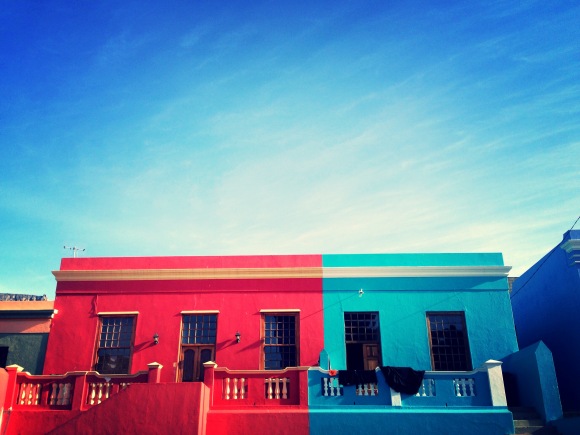
The neighborhood of Bo-Kaap in Cape Town, South Africa (Photo: Alek Shybut)
An hour before my bus departs, I’m sitting in a small restaurant in Maputo, the capital of Mozambique, with a Coke and my phone open to sites about Cape Town. The television on the wall turns to the evening news, and the opening story is about the ongoing violence due to xenophobia near the area of Durban in South Africa.
I switch sites and do a quick Google search of xenophobia in South Africa. The definition is the first thing to pop up: “…the unreasoned fear of that which is perceived to be foreign or strange. Xenophobia can manifest in many ways involving the relations and perceptions of an ingroup towards an outgroup, including a fear of losing identity, suspicion of its activities, aggression, and desire to eliminate its presence to secure a presumed purity” (Wikipedia).
Under the news tab, articles are listed describing the political response to the xenophobic violence occurring throughout the country. Some deny its existence while others swear to battle to end the ongoing turbulence. Mozambicans are listed among the groups being attacked and sent back to their host country. Immediately I feel slighted. Members of the Frelimo party, the national party of Mozambique, are on the television decrying the violence.
Being a foreigner in a still new land, I find myself wondering in which group I am living: the ingroup or the outgroup. While I am not Mozambican, I often tell members of my community that I am in order to earn their trust. Often they laugh, but I know they understand my intentions. I am most certainly not South African, so that leaves American. However, with all the horrific events occurring within our country since leaving for Africa, it’s hard to relate to the political climate. I sit in silence in the restaurant, tangled in thought.
———————————
The bus is larger than I had thought with seats that completely recline in order to sleep during the first leg of my overnight trip from Maputo to Johannesburg. I find myself sitting on the second level of the bus in the very front with a large windshield in front of me, displaying the city lights of Maputo. My own personal observation deck.
“Excuse me,” a soft voice comes from behind, “but is anyone sitting next to you?”
A Mozambican man stands near to me, and I gesture toward the seat, welcoming him. We introduce ourselves, and I learn he is originally from Mozambican but has been living in Johannesburg for the majority of the past 10 years. He talks fondly about Mozambique and how it has changed over the course of its young 40-year history as an independent country.
We exchange notes on the different parts of the country, our favorite areas to visit, and the areas that still need the most help. We agree that Maputo has become somewhat of an urban sprawl, complete with western chains and South African product. He mentions the tea fields of Gurue. I mention the Portuguese architecture and untouched nature of Ilha de Moçambique. We laugh in our shared knowledge of quirks, mainly in the form of the national transportation. We stretch our legs toward the viewing window, laughing as we describe how it’s the complete opposite of traveling by chapa (small mini-buses).
Deep into the overnight trip following a few failed attempts at sleeping, he asks me if I’m Christian. I explain to him my experiences with faith, and he opens up to me about his own personal walk with his faith. He opens his phone and shares a book written by his favorite pastor. He promises to send me an e-mail with more information on the man, who he says is one of the wisest men he’s ever known. I’m grateful for his kindness.
The bus stops at a series of bright lights and small buildings blocking the highway. “Come on,” my friend says to me. “Let’s go.” The bus starts to empty, and I realize we’ve made it to the border of South Africa, and we are required to exit the bus, walk through the immigration process, and proceed to the other side by foot. It’s 3:00 a.m. and pitch black.
Passport in hand, I follow side by side with my friend and the other passengers of the sleeper bus. Immigration involves queuing for a while, speaking with a border patrol agent about our visit to the country, and a quick stamping of the passport, but the complex is extensive, confusing. I quickly become separated from my friend and am swallowed into the group.
When I come out on the other side, I’m unsure of where to go. I scan the room and find a familiar face, my friend, waving me toward an exit near the back of the first building. He had waited for me to finish to continue to the next building. We pass armed guards without any hassle, and we eventually find our way back to the bus to finish our journey.
Upon arriving at the bus station in Johannesburg, I explain to my friend that I’ll be staying at the bus station until my next bus leaves 8 hours later. He offers his house as a place to sleep for a while before heading back to the station to catch my bus. I thank him for his kindness but decide to stay at the station until my next bus leaves. We shake hands, and he walks toward his car to return home to his family.
——————————-
With my backpack and small bag thrown over my shoulder, I walk around Cape Town taking in the scenery: Table Mountain is seen in the distance with its flat top and a small cable car station dotted at the far end. Small restaurants and shop fill the streets, and families walk in groups with ice cream or bags of food in their hands. A small art market is tucked in a small central square area with vendors of locally crafted goods.

The neighborhood of Bo-Kaap in Cape Town, South Africa (Photo: Alek Shybut)
A couple days before when I first arrived in Cape Town after my second bus trip, I explored the city with a friend from the states. We visited the colorful district of Bo-Kaap before sitting on a small step of a park and people watching our way through the rest of the day. That night we met locals at a busy bar on Long Street, even taking a photo with a man who resembles almost exactly my former roommate in Atlanta. When the photo was posted on Facebook, both of my former roommates were shocked at the likeness.
Today, I am alone in my exploration of the city. The tour bus I take drops me at the base of Table Mountain. I ride the cable car to the top with camera-ready tourists, and together we take in breathtaking glimpses of the city below and ocean beyond. At the top of the mountain, my phone dies. My sorrow is soon replaced with access to a free recharging station available for all visitors to the mountain. I smile at the coincidence.
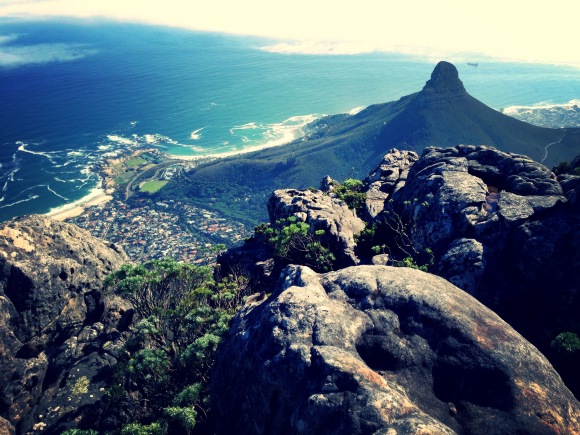
View from the top of Table Mountain in Cape Town, South Africa (Photo: Alek Shybut)
Later we visit a few local vineyards, and while the winter season has turned most of the plants brown, the wine is still in abundance, and I find myself sitting with the vineyards in the distance enjoying a white wine. A little buzzy from the three glasses of chardonnay, I find my way back to the bus and we continue to explore, visiting the beaches of Camps Bay, the ferris wheel at V&A Waterfront, and finally ending up back in the city by evening.
The art market all shut down, the square is now quiet with streetlights guiding the way to my hotel. I walk along the brick street breathing in the day’s air and thinking back to my site in Mozambique. I wonder how my colleagues are doing. I think ahead to helping with the new health volunteers’ training. I try to live in the moment, but the moment is instead living in me, re-motivating me, re-energizing me to return home.
I enter the small, street-side door of the Tudor Hotel on Longmarket street. Described as the oldest hotel in Cape Town, visitors are greeted by a tall staircase, a bar area to the left, and a vintage restaurant with wooden tables. Just beyond the restaurant is reception, and a robust woman greets me as I enter. She finds my reservation, explains the details of the stay, and gives me the key to my room. She helps me to find the room.
As she drops me off at the room, she asks me what I think of Cape Town. I tell her it’s gorgeous and that I’ve already decided I want to spend the rest of my life within its borders. We both laugh. She finishes by asking where I’m coming from.
As I open the door, drop my bags inside, I look back and tell her, “I’m from Mozambique.”

My mother and younger brother at a pre-graduation ceremony in Atlanta, GA
She loves the wide open spaces of the Midwest. Growing up in Iowa, her current house in Nebraska is filled with paintings and portraits of vast fields, hills dotted with cows, and red barns peeking over the horizon. The calmness of the plains speaks to her in between sessions of hectic work schedules and daily chores.
She’s devoted her life to serving those who cannot grasp to this life alone, and she does it with warmth, passion, and without asking for much in return. People take the time to reach out to me to let me know the impact she’s had on their or a family member’s life. I take the time to respond with a simple, “I know, she’s my mom.”
She swims comfortably in the vast openness of literature, expanding her political knowledge while satisfying her urge for realistic crime fiction (a shared interest among us). Her house is filled with piles and shelves of books already read, waiting to be either read again or passed along to another eager reader.
The Beatles blast from her home stereo while giant beetles take over a metropolitan landscape in SyFy’s latest movie of the week. Her small bichon is curled in a ball next to her as they share glances and laugh at the absurdity of whichever 90’s has been was chosen to battle the CGI insects.

My sister and mother (along with my niece) at a family event
She’s raised a mother of her own. My sister enters a room, and immediately those in it feel a presence of warmth and lightness. Her kindness makes her role as Director one much revered and respected, while her humor and self-awareness make her a force to compete with in the world of advertising and hilarious e-mails.
I know her best as my older sister who put up with our cruel tactics as three brothers attempting to find the breaking point of another species: girls. She paved her own path while living in a world of joy, fun, and close friendships. Her friends call her rare, and they are by her side at a moment’s notice.
She strengthened our family when she and her husband, my brother, brought their daughter into this world. As a mother she’s caring, understanding, and allows her daughter to explore the same world that she once found herself exploring. Her daughter is just as hilarious and sweet as my sister, and I find myself missing them every movement of every day.

My grandmother with my mother at an event
Needless to say, my grandmother has raised two mothers of her own. I remember summers as a child spending weeks with my grandparents in their home in eastern Nebraska. My grandfather would take us fishing and my grandmother would show us the complexities of home cooking. To this day, when I think of good food, her mashed potatoes and holiday desserts are hard to beat.
Her birthday cards each year are written with elegance and curves as she explains the passing of time in her hometown and wishes good thoughts upon us. The comfort and love that come from receiving her letters are hard to explain but not expressed enough. They are everything and loved so much.
I’m fortunate to have these women in my life. While in Mozambique, their wisdom and humor fill my days through quick chats or sent photos. Their lives are about balance, but they do it with grace, and I will forever live to find the same amount of drive and passion for life.
Happy Mother’s Day, my mothers.

The woman points toward an unimpressive house adjacent to the recently constructed gas station parking lot. The cement extends toward the house before breaking up, exposing thick grass that rests upon a lanky, wooden fence that obscures the view of the yard.
“A woman used to live in that house,” she says staring in the direction of the house and barely blinking. “She died last week.”
“That’s so sad,” I say in response, now also staring toward the house. “What happened?”
“She died from some disease,” now she’s looking in her lap and fiddling with her cell in her hands. “Not sure what disease.”
I tell her that I work in a hospital up the road about 100 kilometers and see a lot of patients who abandon their treatment early for various reasons and end up dying from the complications.
Seemingly unsurprised by this information, she raises her eyebrows and rises from her chair to go and help a customer who is putting gas in his car’s tank. “If it’s God’s will,” she says as she continues toward the man, “it’s God’s will.”
———————————-
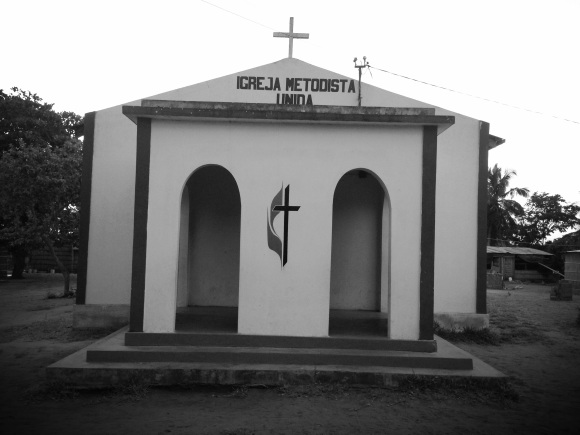
I’m taken aback by the sight of it. A familiar symbol (above) is painted above the entryway to the church: the thick, black cross with the red cloth resting upon the arms. The words Igreja Metodista are painted above the symbol.
Until this moment, I had not seen a Methodist Church in Mozambique. Sure, I’d seen places of worship for other beliefs – Muslim, Catholic, Evangelical – but this was different. This was personal.
It’s a few days before Christmas Day, and I’m visiting close friends in the southern province of Inhambane in Mozambique. I take a moment to let the sight of the church sink into place before continuing on to my friend’s house located next door.
A few days later, I excuse myself from my group of friends and head toward the church. I expect to encounter life and jubilance and, instead, am surprised to find the church completely empty. The front door is propped open, and the wooden shudders that act as windows are spread wide, flooding the interior of the church with the remaining light of the day.
I slowly move through the small church, taking in the familiar and appreciating the unfamiliar. Long, wooden pews stretch in rows through the room. Tucked in the back of the pews are hymn books. I brush my fingers along the smooth wood as I pass toward the front of the room. Each window I pass reveals something new: a child running past, thick trees producing fruit, the sun setting in the distance.
I find myself at the front of the room looking down at a table adorned with flowers, books, and pieces of cloth. In front of the table is a podium. I let the image of a packed church fill my senses.
My phone buzzes in my pocket, and I turn it on to find messages from home wishing me a Merry Christmas. It didn’t feel like Christmas before, but today it does.
I sit down in one of the empty pews, lift a hymn book from the back of the pew in front of me, and I open it to a random page. I tuck my nose into the crease of the book and inhale deeply, pulling from the book a familiar scent and welcomed calm.
——————————–
I’m standing next to my father in a packed worship hall with the rest of the congregation. We are all singing a hymn while the pastor and co-pastor walk up the aisle and out of the room following the service. I notice that nobody is really singing, and I strain my voice to match the volume and pitch of those around me. I know I can sing better, but I don’t try.
I’ve been going to church with my father and siblings for as long as I can remember. The church is a beautifully constructed building tucked in my small town in my small state. The triangular, main worship hall is home to a towering plate-glass window that stretches from the floor to the highest point in the ceiling.
In front of the window is a sizeable, wooden cross that hangs high above the heads of the congregation, held in place by chains. The pastor stands below this cross in sermon, and during each service, it’s hard not to worry that one day the cross will fall. It doesn’t.
I grew up in the walls of this church, attending summer programs, joining my family for Sunday and holiday services, and volunteering to help younger kids. Some of my closest friends grew up in the walls of this church. Some of the cutest girls in our town attended this church. Each Sunday, I would scan the room looking for a current crush.
We follow the congregation out of the church and head for our car. We won’t return to the church until the following Sunday, but that doesn’t mean that I leave everything inside its walls.
Each night as a teenager I find myself praying in a similar routine before I sleep. Using the same script but splicing in names of people or concerns of the week, I fold my hands together, close my eyes, and whisper my message into the world. I don’t know who’s listening, but I have hope, optimism, faith that someone is.
———————————–
The document is opened on my computer at my desk, but I’m staring out the window. On the opposite side is a row of bushes and a patch of grass that stretches to the cement parking lot. A grasshopper has landed on the window. I rise from my seat and get closer to the window to look at the colorful details of the insect, but it jumps away as I approach.
The next day I decide to quit my job at the bank. It’s a great job working with friendly, passionate people, but I didn’t share the same passion for the work. Something inside me had been leading me to this day, shaking at me and alerting me to a life unlived. I pack up all my belongings and make the drive from Nebraska to Washington State.
During my two years in Seattle, I spend my Sundays at a middle school located close to my house that hosts Mars Hill, a popular Christian congregation in the northwest and west. The group isn’t without controversy with some members calling the group a cult and denouncing the church’s leader, Mark Driscoll, for his sometimes radical practices.
For me, the group is a place to find the familiar calm felt growing up. While that calm had since been replaced with stress, sadness, insecurity, and uncertainty, deep within my soul was a faith that everything will turn out fine.
I continue to spend my days living with this notion in my heart, although my faith has always been a private one.
Looking back, the decision to leave Nebraska saved my life, but whose decision was it? For the longest time (and still today), I knew it was my decision, but I also know that it was driven by faith, a belief strengthened through the church.
So I ask again, whose decision was it?
————————————
I’m sitting with a book in a restaurant in my small town in Mozambique. A doctor friend who is visiting from the provincial capital to work with cataracts patients in my area approaches my table. Behind her is a short man with a large smile on his face.
“Alek, I want to introduce you to someone,” my friend says as she gestures toward the man. “This is Jose, he is the pastor at the Catholic church here in Namapa.”
“Nice to meet you, father,” I say and extend my hand.
He grabs my hand and, with a smile on his face, says “It’s very nice to meet you too. I’m very happy that we are able to meet.”
He continues to tell me that he’s been living in Mozambique for about a year, is originally from Mexico, and wants to learn English because he has family in Scotland. I tell him that I’m happy to help, and he leaves the restaurant thanking me numerous times.
A few weeks later, the father contacts me and says he wants to have lunch with me at his house. Joined by another volunteer from a nearby town, we head to the church and meet him by the main road. He leads us through a set of large, metal doors that lead to his house and main yard.
He tells us that 14 young boys work with him at the church, and that with time they’ll be able to preach as well. My friend and I meet a couple of the boys, and we continue into the pastor’s main living area that has a table set for our lunch.
On the walls are pictures of religious leaders, including Pope Francis. The pastor has bookshelves stacked with literature on religious practice, language books, and other materials. Set on the table alongside the plates is a small speaker. The pastor turns on the speaker, raises the volume, and The Beatles’ Let It Be fills the room.
“I love this music,” he tells us. “The Beatles!”
We tell him that we also love the Beatles, and the smile seen at the restaurant grows across his face as he gestures toward the food to help ourselves. The meal consists of corn on the cob, potatoes, salad, and rabbit, which the pastor raises at his house.
We finish the meal, and the pastor tells us how happy he is that he met us. “Thanks be to God,” he says as he raises both his hands toward the ceiling.
“Thanks be to God,” my friend and I say in unison as another Beatles song plays from the speaker.
——————————————
Her comment catches me off guard. How could the death of a woman from a preventable disease be the will of God?
It isn’t the first time I’ve heard this in Mozambique. When someone passes of old age or disease or accident, it is common for the people to find their comfort in knowing it’s God’s will.
While it’s easy to be cynical of this view (and many volunteers are), who are we to try and tell anyone how to find comfort, how to find faith?
How are we supposed to be strong volunteers without faith in something? Having faith in the better, the stronger, the more righteous can guide our hands, our actions.
Will we be able to work in cooperation with the many churches here to deliver beneficial health information? Information on prevention? Long-term behavior change?
Perhaps the answer is simply: If it’s God’s will, it’s God’s will.
————————————
Questions? Comments? Contact me!

A Peace Corps staff member assesses the projects planned and presented at the Community Health Project Design & Management conference in Nampula City, Mozambique.
Half the room is made up of American (and one Puerto Rican) volunteers, and the other half is made up of our Mozambican counterparts. We enter the conference room for the start of a three-day training that promises to introduce all of us to project implementation in our communities, a topic that all of us need to understand as projects start to get off the ground.
The all-Portuguese training begins, and I realize the importance of the situation. Roughly 25 years ago, this country was tangled in a civil war that crippled the country, destroyed infrastructures, and left emotional scars that still remain today. While not many people here openly speak about the war, it’s clear to see the effects on the developing country.
However, one product of the end of this war was pure, and understandable hope for a brighter future for the country and its people.
My counterpart is sitting next to me as we spend the day learning about the role of Peace Corps volunteers in Mozambique, developing goals and objectives for our plans, and starting to list out the activities which we are going to complete once we return to our sites.
The American volunteers are familiar with this environment as we scoff at the pile of papers and handouts we receive throughout the day. However, to our Mozambican counterparts, the information is (mostly) new and (mostly) exciting, sparking an energy in the room that is hard to resist.
A fellow PCVs counterpart is a community health worker. He lives a very simple life, but today he is attending a conference in an urban hotel surrounded by accommodations, intelligent discussions, and a bountiful supply of water and food.
To say that he was elated would be understating it. He was completely and totally beyond himself. Literally, a world had been opened up to him. Not one of excess, but one of deserved recognition for the work that he and the other Mozambican counterparts do on a daily basis.
While employment is hanging over every conversation with volunteers as the country faces high unemployment, especially in rural areas, he sits in his seat for the remainder of the training with a smile across his face and a shirt nicely ironed and buttoned all the way to the top.
We spend three days exchanging ideas, mapping out our activities, and providing advice to one another. While us Americans see this as a normal, everyday brainstorming session, Mozambicans embrace this dialogue as the new foundation to their newly developed home. These conversations provide them a glimpse into a world that is not fully their own but, at the same time, just within their reach. A world of community health and progress. A developed world.
I share a table with my counterpart, and he is also elated. He speaks up often, shares his insights, thanks for me bringing him to this place where he is learning much.

Ivan with the final project proposal.
As an unemployed member of our shared community, my 28-year-old counterpart, Ivan, thrives on giving back and offering his hands and heart. He describes to me in detail during a lunch break that his last name isn’t actually his last name, as his parents disappeared when he was very young, leaving him to grow up in an orphanage. When asked about his parents, he only knows that someone told him his parents were taken away with the trash.
Today, he’s advocating for youth and health in our community. He is engaging in difficult conversations to move the efforts closer to success. At the conference, he develops a plan to work with the HIV-support groups in our town to raise chickens for sale, gaining money for the groups and the promotion of support groups.
We can learn something from Ivan and Mozambicans: conversation with peers about moving forward should be our constant motivations in life. Why can’t we all see the bigger picture for the future of our own country? Instead of bowing our heads during brainstorming sessions, let us raise our fists and demand change.
The conference asked us to design a project. However, the conference also asked us to be better listeners, not only to our own peers, but those on the outside who still have the motivation and energy to love more, push harder, and seek results.
Ivan, as well as the other counterparts, receive certificates for their work during the conference. A piece of paper to us, the next step in changing their home for the better to them.

Ivan with Peace Corps staff receiving his certificate for completion of the training.
———–
Questions? Comments? Contact me!

Today was the first meeting for our new health journalism group we are starting in the community to provide practical writing and speaking skills to teenage students in Mozambique.
After explaining to the students that they would not be learning English in the group (“the people who we will be helping and listening to in the community don’t speak English, so why should we?”), we started with a (seemingly) simple question: What is journalism?
The students broke into pairs and had five minutes to think of an answer in one word (which helps keep it simple, but also helps my limited Portuguese). The following answers were given from the group of 18 students, ages 12-19:

The translation of the answers is: organization, messages, information, words, collect, organization (x2), means. I wanted to see where the knowledge of the students landed, and me and my counterpart helping with the group were happy with the results! The collection of information and the use of messaging seemed well known to them. We are on the right track.
We finished the hour-long group with a game of the human knot (header photo); however, explaining the game in Portuguese proved more difficult that first expected. The students locked hands but started to spin in a circle as a group. After a few attempts, we broke up, collected contact information, planned the next meeting, and dismissed.
We hope to connect the group with this blog to provide an avenue for the students to share their thoughts, their findings, their lives with people around the world. This is an ongoing series and will result in a better understanding of Mozambican youth through health, journalism, and cooperative learning.

With Peace Corps Week in full steam and Michelle Obama’s declaration for more opportunities for girls around the world, I’m thinking back to my first two months with my homestay family, who provided me so much without them ever really knowing or understanding why. It’s simple for me to say, “I appreciate everything you’ve done for me,” but it’s harder to show them how deeply their love for a stranger, a foreigner would shape the rest of my service, or how I view Mozambicans and my purpose of being here.
When you are only able to communicate through non-verbal gestures, especially in the first two months with a new language, it’s difficult to explain the impact of a positive homestay experience.
So, instead, we danced and played.
Usually my days were filled with training and language, but during the evenings and weekends, my sisters and brother would pass the time with listening to music and dancing in the kitchen or on the veranda, much to my host mother’s amusement.
Together we developed a beat-box rhythm that all the neighborhood children would sing as I walked through to my house. Without audio, it sounded a lot like boom-chicka-chicka-boom-boom, but with more bass and the backdrop of the rolling hills of Namaacha in southern Mozambique.
Wilson, my brother, was best at laying down the beat, and my sisters, Ester, Diana, and baby Ayume, filled the air with high laughter and enormous energy. Ayume slapped her hands together or against the table to try and keep the rhythm.
Little do they know – I speak to them when I can, which is far in between – that the time with them has shaped my perception of the people here, the country, and my role. They are forever in my heart and mind as I journey into the unknown of service. The beat is always in my heart, and I look forward to new rhythms, new moves.

A classroom at the Secondary School in Namapa, Nampula in Mozambique.

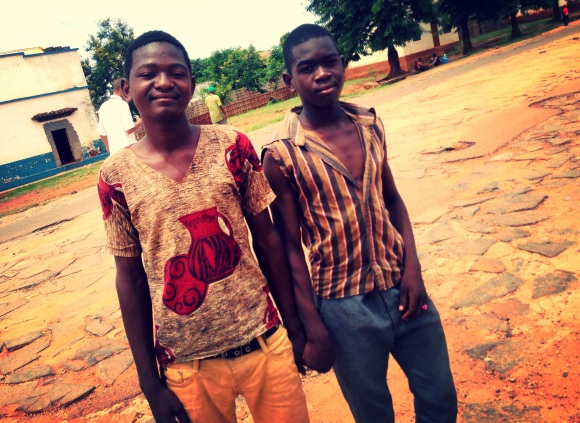
Same-Sex Friends Holding Hands
A recent study (LiveScience) in the United States found that the majority of the population still feels uncomfortable when they see two people of the same sex holding hands. While our country has, thankfully, made much progress in terms of accepting and understanding the diverse communities that share our home, we are still far behind in creating a safe climate, especially when as individuals we are not questioning our own thoughts and beliefs.
A couple months into my site, and I found myself holding hands with a male friend of mine as we joked, laughed, and walked back to a mutual friend’s house. Walk around Mozambique and you’ll quickly notice that the gesture of holding a friend’s hand (regardless of sex) is common and just as beautiful as it sounds (header photo).
Teenage students walking out of a school, an older adult leading his friend through a busy market, two doctors having a conversation in the middle of the hospital, two friends walking and joking down a street. How simple life is if we can simply let go of our uncomfortable thoughts and hang on tight to the one thing that bonds us: humanity.
Respect for Different Religions
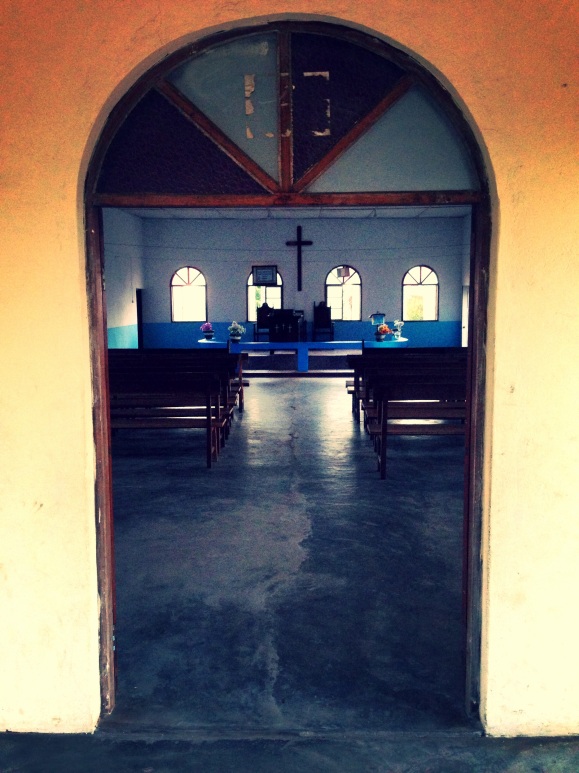
While this may be slightly unfair to say about our current American climate, nowhere else have I seen people with drastically different religious beliefs living in such unified harmony than in Mozambique. On any given day, one can see the congregation of the Catholic church gathering in the main lawn while the daily prayers from the mosque’s loud speaker fill the air above.
In the United States, a person is often not only judged by what they do but also what they believe. In our current climate, an individual’s beliefs are firmly tied to the actions and beliefs of others who identify themselves under the same religious umbrella, and we are quick to label the individual as a bigot, an extremist, a terrorist.
However, what an individual believes in Mozambique is the sole property of the individual. Their beliefs are not questioned, denounced, analyzed. One face is equal to another, and in a country that thrives on development and moving forward, it’s refreshing to see that the people of Mozambique have already learned something that American’s haven’t: tolerance.
Fun FYI: While writing this portion of the post, I was introduced to a Pastor who works at the local Catholic church. He is from Mexico and wants to learn English. Serendipity or divine acknowledgement?
Watching (As In Watching) the News
In a packed bar in my town, people crash glasses together, laugh loudly at inside jokes, and join together in singing and dancing. The television is showing a movie with the audio projected from speakers. Nobody is paying any attention until the movie ends and the program switches to Jornal da Noite (Nightly News). Silence blankets the bar, and all eyes turn to watch the television or screen and listen in as the anchor delivers the news.
The country is large, but when it comes to the news, everyone in Mozambique wants to be informed of the happenings across their homeland. Whether they’re getting updates about the floods in Zambezia or watching as two burglary suspects are placed in front of the camera in a display of public shaming, Mozambicans love their news. While one could argue that it’s simply an issue of variety (Mozambicans usually watch either the news or telenovellas), the amount of interest in the news is hard to ignore.
Election Season Enthusiasm
Coupled with Mozambicans’ love for the news is their commitment to national elections and choosing the best leaders for their communities. During the 2014 Presidential Elections (which usually only occur after two, 5-year terms of the sitting president), the energy in the air around the election was thick and loud. From the rallies that filled the streets in a color-coordinated act of support or the political posters that blanketed the town, Mozambicans made it clear that they are pushing for progress.
One of the better sights of the election season last year was seeing a truck full of older women (mid-50’s) with large signs, megaphones, and matching shirts yelling as they drove through the community to promote their political party. Regardless of sex or age, Mozambicans will put work on hold for the possibility of improving their daily lives. Crazy, right?
Rainwater as a Resource
When I first got to the country, other volunteers as well as Mozambicans described the impending rainy season. “It’s horrible,” my German neighbor told me. “The roads become rivers, and the rivers become seas.” It was hard to believe him at the time, but upon returning to my site following a trip south for the holidays, the rain was heavy, the power quickly went out, but one thing surprised me most: the use of rainwater.
Children were using falling water from the roofs to wash their bodies (photo above). Teenagers with large buckets were collecting the water and carrying it out into the neighborhoods. Women were using small, plastic bottles to refill their beverage with fresh rainwater from the hospital roof (photo above). At first, it was hard to join on the rain-wagon. “I’ll just carry my water from the mosque,” I said. “I don’t need to use the rainwater.”
When the power finally went out for the month, it was clear that rainwater was the best option. I bathed in the water with the kids from my neighborhood, it became routine to set out my buckets during a heavy rainstorm and even wash my dishes and clothes with the falling resource. While we don’t necessarily need to establish a similar routine in the states with our abundance of water (in most states), the notion of this reusable resource is intriguing.
Reusable Resources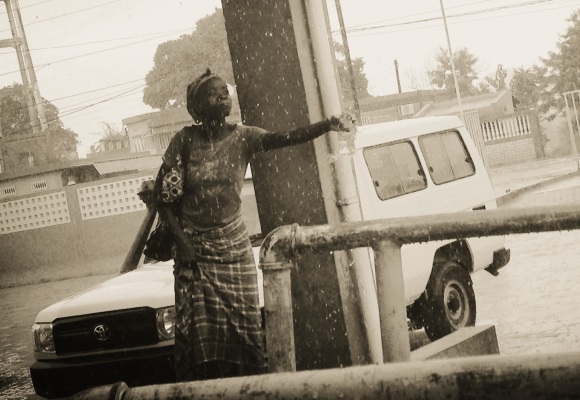
With the increase of products being imported into the country (looking at you Coke), the amount of litter that is filling beaches and roadsides is staggering. However, people of Mozambique have learned to reuse these some of the resources found throughout the community in the house, in the market, and in their gardens.
Acting as water bottles, small Coke bottles are used to refill water (photo above). Vendors in the market use the same bottles to fill with oil to sell on the side of the road. Plastic coverings from mattresses and plastic bags are used to cover bananas as they hang on the tree, preventing insects from destroying the plant. While the country is still in dire need of a recycling plan, the community is attempting to reduce the abundance of trash by recycling it themselves.
Gardens & Fresh Produce
The rainy season not only brings the floods and abundance of drinkable, usable water, but it is prime time for Mozambicans to build their gardens (photo above). The community is transformed from dry and dirty to fertile and lush lands, producing not only fresh produce for consumption and sale, but also providing local community members more work in the building and maintaining of the large gardens.
Children, teenagers, adults, and older adults will all be in the garden throughout the rainy season, tending to the crops, harvesting, and selling them in the local market. For this reason, there is a constant supply of fresh produce for the community. However, the issue still remains the cost for those who can’t afford the produce and the need for education of the community to learn how to build and maintain their own gardens.
Bicycles, and Motorcycles, and Walking, Oh My!
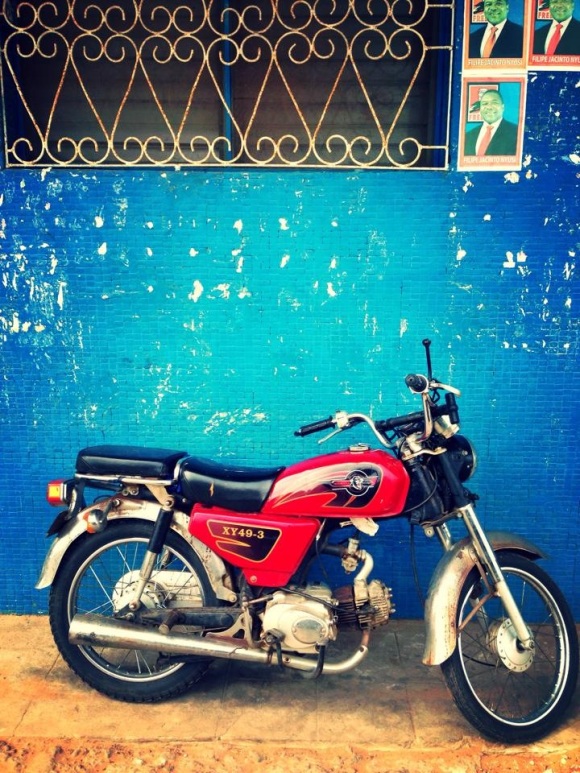
While this just may be a circumstance of both income and increasing development, there are far more bicycles and motorcycles on the roads of Mozambique than large cars. The main highway that runs north and south through the country is packed with larger vehicles used by those who can afford them, but as you travel inward and away from the main highway, the local villages and towns are thriving on smaller, more cost-effective and environmentally friendly (whether they know this or not) means of transportation.
If walking through a small town in Mozambique, you’ll notice people yelling “taxi mota” in your direction. You’ll recognize the word taxi right away and realize that they are providing a service for those who don’t want to walk and need a ride. Usually this is cheap, helps the driver pay for gas, and builds a sense of a growing and thriving community.
Fun FYI: Peace Corps does not allow volunteers to own or use a motorcycle due to the dangers. If a volunteer is caught owning or using a motorcycle, it’s terms for immediate removal from the country. Bicycles, however, are warmly welcomed and recommended.
Hitchhiking (Boleias)
In the United States, hitchhiking brings to mind plenty of movies and stories about the dangerous men and women who walk the interstates and highways in search of trusting drivers. For this reason, hitchhiking is both illegal in the states and generally looked down upon as a collective culture. We’d rather drive to our destination with the doors locked and eyes forward.
In Mozambique, it’s not uncommon to see people receiving boleias (Portuguese for lifts) from friends and strangers both inside the community (on the back of motorcycles) and along the national highway. This is an ongoing topic being discussed by both Peace Corps staff and volunteers, because it could potentially be dangerous; however, the consensus is that it’s a safer option to the country’s national transportation, which is dangerous and often leads to more accidents than hitchhiking.
Business Owners, Community Members, Thriving
With the discovery of gas in the northern province of Cabo Delgado and other natural resources that are underneath the country, more and more international companies and organizations are moving in to harvest and export the resources. While this is creating additional jobs and increased money into the country (although many doubt that the money will be put back into the communities because of unchecked corruption), it’s also creating a dependency on international companies instead of looking inward.
Walk around a smaller community, and you’ll see small businesses and shops owned by members (even families) of the community. With enough motivation and resources, a person in Mozambique can build and maintain a rather successful small operation in a small town. The country has yet to build large factories or companies, so in the meantime, the age of the local business owner is still strong and vibrant, including agriculture.
———————-
Questions? Comments? Contact me!